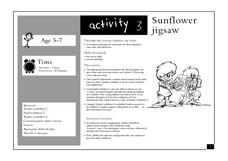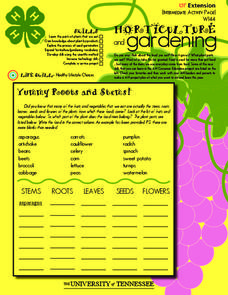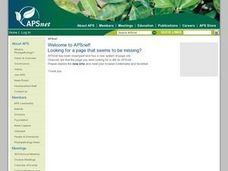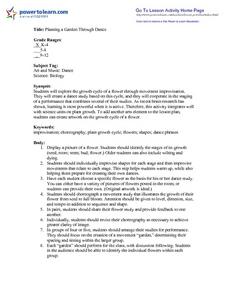Curated OER
POLLINATION DEMONSTRATION
Third graders study the terms pollen and pollination. They use appropriate vocabulary in describing their investigations, explorations, and observations (e.g., stem, pistil, stamen, flower). They describe, using their observations,...
Curated OER
Design Engineer Problem
Learners design a flower-pot and saucer. In this math lesson, students incorporate the use of technology to correctly build and shape a flower pot. They calculate the necessary mass of the red clay used to make the pot.
Curated OER
The Magic School Bus in a Beehive
Learners learn along with Ms. Frizzle's class. In this Magic School Bus lesson plan, students dance the Honey-Bee-Bop to communicate the location of hidden flowers.
Curated OER
Build a 3-d Plant Model
Third graders construct a three-dimensional model of a flowering plant. They examine the major plant parts and their basic functions. They demonstrate an understanding of the similarities and differences in the physical...
Curated OER
Plant Pipes
Students work together to discover the path water follows in plants. They create multicolored flowers. They label each part of the plant and note their function.
Curated OER
Sunflower Jigsaw
Young scholars recognize and name the main parts of a flower. In this life science instructional activity, the teacher leads a discussion about the parts of a plant, then students color and cut out the parts of a planet, then glue the...
Curated OER
Natural Inspiration
Students relate math to the real world. In this algebra instructional activity, students compare plants to math and relate their artistic ability to concepts in math. They draw pictures of flowers, leaves and trees.
Curated OER
Buzzy, Buzzy Bee
Students simulate honeybees pollinating flowers. In this pollination lesson plan, students role-play the process of pollination over the course of several seasons. Students graph results and share their graphs with the class.
EnLiST
Trap Your Own Insects: What’s in Your Backyard?
Young entomologists construct three types of insect traps—pitfall, pollinator, and panel—before setting their traps out and observing what they caught. They then observe what types of insects the different traps attract.
Curated OER
Horticulture and Gardening
In this colorful packet, students engage in a variety of activities involving plants and seeds. After answering the 50 questions in the packet, learners can go on to delve into their own projects.
Curated OER
All About Plants
Students identify plant needs. In this biology lesson, students watch All About Plants and then write a paragraph describing the various details about plants.
Curated OER
Life cycles
Students identify and explain the parts of a flower and their role in the life cycle of flowering plants, including pollination, seed dispersal, and germination. Students recap the following information: that plants need light, warmth,...
Curated OER
Edible Plants
Students determine what part of a plant they are eating when they eat different fruits and vegetables, and make collages of fruit and vegetable pictures that are flowers, fruits, leaves, roots, seeds, seed pods, stems and tubers.
Curated OER
Blooming with Self-Confidence
First graders read "Leo the Late Bloomer" and discuss what it feels like when they are struggling to master a new skill. They make flowers showing several things they all ready know how to do and one thing they are still learning.
Curated OER
Apple for the Teacher
Students use apples to create a fall flower gift. In this art lesson, students core apples, and place a floral vial with a flower in the apple. Students give the project as a gift.
Curated OER
Plant Parts and Their Diseases
High schoolers see how certain plants are very important to us. They explain that healthy plants are important to keep people healthy. They study the major parts of a plant (root, stems, leaves, flowers, fruit and seeds) and their basic...
Curated OER
Plant Reproduction
Fifth graders discuss the way a plant can reproduce from roots, stems, and leaves instead of the more familiar way of flowers, fruits, and seeds. In groups of four, 5th graders pick a plant group. Each group then writes a report,...
Curated OER
Mother's Day Handprint
Students make a Mother's Day flower out of one's hand print. In this art lesson, students paint the palm of one of their hands with red keeping the fingers and thumb together pressing the hand onto the top half of a...
Curated OER
Planting a Garden Through Dance
Students create a dance study based on the growth cycle of a flower. They improvise movements that relate to each stage of growth. They create artwork on the growth cycle of a flower. They perform their dances for the whole class.
Curated OER
Matisse for Mother's Day
Learners create a Mother's Day card with tissue paper flowers in the style of Henri Matisse.
Curated OER
Plant It!
Learners watch a video on the parts of plants and their uses. They then observe a live plant and on a worksheet label the four main parts of the flower (flower, leaves, rooms, and stem).
Curated OER
Counting Petals
Students solve addition and subtraction problems. In this problem solving lesson, students solve math problems written on flowers. Using petals as a counting aid, students demonstrate the answer by attaching the correct number of petals...
Curated OER
Explore: 1st Grade Plant Observation
First graders grow seeds in a mini terrarium. They compare the root systems, stems, leaves, and flowers of the different plants. They categorize the plants and discuss the basic functions of plant parts.

























